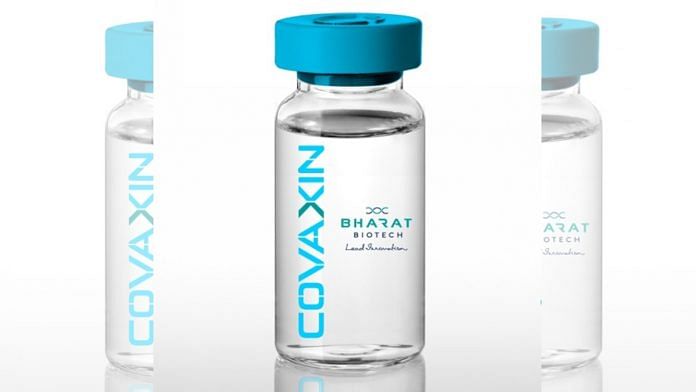New Delhi: India’s indigenous Covid-19 vaccine candidate, Covaxin, has been recommended for restricted emergency use authorisation by the subject expert committee appointed by India’s drug watchdog —Central Drugs Standard Control Organisation (CDSCO) — despite not having released any efficacy data.
Officials told ThePrint the subject expert committee clearance means Covaxin can be included in the government’s vaccination drive, as long as any adverse events following immunisation are reported within a stipulated time period. The SEC was appointed by the Central Drugs Standard Control Organisation to advise and make recommendations to the government regarding Covid-19 vaccines.
The vaccine, produced by Hyderabad-based Bharat Biotech in collaboration with the Indian Council of Medical Research (ICMR) and National Institute of Virology, Pune, has courted many controversies since it first began human trials on 29 June, the emergency use authorisation being the latest.
ThePrint explains everything you need to know about Covaxin — from how it works to its various controversies.
Also read: What next as govt expert panel gives conditional nod for Covid vaccines Covaxin and Covishield
How it works
Covaxin is made of an inactivated vaccine, meaning the vaccine is made up of the virus that has been killed and can no longer cause infection. When injected into the body, immune cells can still recognise the virus, even though it is inactivated, which is what triggers an immune response.
The vaccine was made by the NIV by isolating an Indian strain of the virus.
Trial results so far
On 22 December, Bharat Biotech published data from its phase 2 trials with a follow-up on its phase 1 trial, on a non-peer reviewed website.
The data showed that the vaccine was safe with no serious adverse effects having been observed. The study also “hypothesized” that T-cell and B-cell immunity generated from the vaccine “may persist until at least 6-12 months after the second vaccination dose.”
The study also said that an evaluation of safety outcomes would require a large-scale phase 3 trial.
Bharat Biotech was granted permission to conduct phase 3 trials on 25,800 volunteers on 23 October — making it the country’s largest ever efficacy trial.
On 22 December, the company announced that it had crossed the half-way mark after recruiting over 13,000 volunteers.
The controversies
The vaccine became a source of controversy after a letter, signed by ICMR chief Balram Bhargava, came to light on 2 July. In the letter, he asked principal investigators to conclude all trial phases for a rollout by 15 August.
The ICMR later denied having set a deadline, saying, “Our internal communication is being misinterpreted. We only said that we envisage to have a vaccine by 15 August and it is not a deadline.”
On 28 December, ThePrint reported that Bharat Biotech advised principal investigators (PIs) to encourage volunteers by telling them that enrolling in the phase three trial could give them immunity against Covid-19.
“It may take many months for the subjects above the age of 50 years to be immunised for Covid-19 vaccine,” said the document given to the PIs, which added, “Hence, it will be advisable to participate in the Phase 3 Efficacy Trial for Covaxin and get vaccinated to protect yourself against Covid-19.”
On Saturday, the SEC recommended that the vaccine be given restricted emergency use access despite not having released any efficacy data — meaning, so far, any data proving the vaccine’s efficacy has not been published in the public domain, including any results of an interim analysis.
Bharat Biotech first applied for EUA on 7 December, and was asked by the government’s expert panel, appointed by the Drugs Controller General of India, to return with additional data from its ongoing phase 3 trial on several occasions.
Also read: Bharat Biotech ‘thousands of volunteers short’ for ongoing Covaxin Phase 3 trials
